The Indian textile sector is closely monitoring developments in US trade policy following the election, with experts advising a robust, reciprocal approach should heightened tariffs be imposed. Industry analysts suggest India needs to be prepared to retaliate with equivalent tariffs on US goods if the new administration follows through on pledges to prioritize domestic industries.
This potential trade conflict echoes previous instances where India responded to US tariffs on steel and aluminium by imposing retaliatory duties on various US products, including agricultural goods like apples. This strategic response demonstrated India’s willingness to defend its trade interests while maintaining a balanced approach, according to Ajay Srivastava, founder of the Global Trade Research Initiative (GTRI).
The textile sector is specifically highlighted as being potentially vulnerable, alongside automobiles and pharmaceuticals, if the US pursues an “America First” agenda involving increased import duties. The impact on the Indian IT sector, heavily reliant on the US market, is also a concern, especially regarding potential changes to H-1B visa regulations.
India’s strong trade relationship with the US, exceeding $190 billion annually, underscores the significance of this potential disruption. Abhijit Das, an international trade expert, emphasized that new US tariffs would effectively lock Indian goods out of the US market, making a retaliatory strategy crucial not only for immediate impact but also to strengthen India’s negotiating position for future tariff reductions.
Experts argue that criticisms of India as a “tariff king” are misleading. The WTO’s World Tariff Profiles 2023 reveal that the US also maintains high tariffs on various goods, including significant duties on dairy, fruits, vegetables, and other key product categories. This global context suggests that tariff implementation is a common practice across nations to protect domestic industries.
Industry stakeholders emphasize the importance of comprehensive consultations within India to prepare for various potential trade scenarios. Some exporters remain optimistic, suggesting that strong investment interest from US companies in India might temper the impulse for aggressive tariffs. These exporters also believe that any escalation in US-China trade tensions could create new export opportunities for India in the US market.
Data indicates strong growth in India’s exports to the US in recent years, with a compound annual growth rate (CAGR) significantly outpacing the growth of overall US imports. The existing strong economic ties, reinforced through agreements like the Indo-Pacific Economic Framework for Prosperity (IPEF), offer hope for continued positive trade relations. The US is currently India’s largest trading partner, with substantial bilateral trade flows. Despite the uncertainty, the Indian textile and related industries are preparing for potential trade disruptions while remaining hopeful for continued mutually beneficial trade relations.

